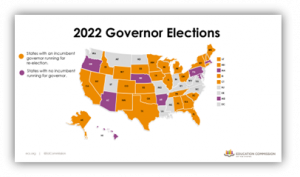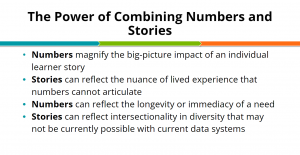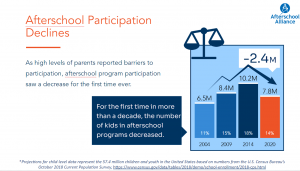Advance CTE’s 2022 Fall Meeting included five breakout sessions that connected timely topics of advocacy of CTE, equipping attendees with strategies to elevate their voice and the voices of learners and partners to advance high-quality, equitable policies.
This post provides a recap of top strategies and resources shared in each breakout, which featured speakers from state teams, national non-profits, philanthropy and education research and communications.
Engaging Policymakers to Create CTE Champions
 With over 30 gubernatorial elections and legislative elections in all but four states, 2022 will likely lead to major changes and transitions in the year ahead for education leadership. Speakers from Education Commission of the States, Advance CTE and the state of Washington provided guidance and tips to successfully prepare for and navigate these transitions. In particular, state CTE leaders should focus on identifying their core messages on the value of CTE, conducting research on what newly elected leaders care most about (and what CTE success stories can be shared from their home districts or communities), and leveraging ambassadors and partners to help carry forward priorities and get the ear of new leaders and their transition teams.
With over 30 gubernatorial elections and legislative elections in all but four states, 2022 will likely lead to major changes and transitions in the year ahead for education leadership. Speakers from Education Commission of the States, Advance CTE and the state of Washington provided guidance and tips to successfully prepare for and navigate these transitions. In particular, state CTE leaders should focus on identifying their core messages on the value of CTE, conducting research on what newly elected leaders care most about (and what CTE success stories can be shared from their home districts or communities), and leveraging ambassadors and partners to help carry forward priorities and get the ear of new leaders and their transition teams.
Moving Beyond a Seat at the Table: Advancing CTE through Partnerships and Collaboration
The intersectionality of CTE leads the creation of high-quality partnerships to be not just good strategy but a necessity. The Bill and Melinda Gates Foundation and Achieving the Dream, both national partners of Advance CTE, shared best strategies to create partnerships that will better deploy and connect federal state and philanthropic resources, and ultimately address gaps that impede the success of learners. Speakers emphasized that successful partnerships must have shared objectives and mutual needs. When asked about the conditions philanthropic organizations seek when investing in a new partnership, three main areas are identified: flexibility, having the right individuals at the table and bought in, and an understanding that the partnership is not a product bought but rather an opportunity to create connections.
Connecting Data and Learner Voice for Next-Level Storytelling
 This session featuring Advance CTE and Edge Research inspired attendees to amplify learner outcome data and testimonials to create impactful data stories. Attendees were reminded to be in the driver’s seat on creating data ‘headlines’’ and to be proactive in addressing assumptions others might make about data. First step routines were also provided, such as mapping schedules for quantitative and qualitative data collection, quantitative data reporting and qualitative data access opportunities and comparing timelines with storytelling opportunities.
This session featuring Advance CTE and Edge Research inspired attendees to amplify learner outcome data and testimonials to create impactful data stories. Attendees were reminded to be in the driver’s seat on creating data ‘headlines’’ and to be proactive in addressing assumptions others might make about data. First step routines were also provided, such as mapping schedules for quantitative and qualitative data collection, quantitative data reporting and qualitative data access opportunities and comparing timelines with storytelling opportunities.
 Edge Research provided storytelling tips — one included creating three to five headlines that encompass a data point audiences might not expect, highlight the most urgent findings, and provide a call to action. It is important to humanize qualitative data through phrases such as ‘1 out of X families’ or ‘X number of children need Y’.
Edge Research provided storytelling tips — one included creating three to five headlines that encompass a data point audiences might not expect, highlight the most urgent findings, and provide a call to action. It is important to humanize qualitative data through phrases such as ‘1 out of X families’ or ‘X number of children need Y’.
Advancing Your State’s CTE Goals through State Legislative Policy
Georgia and Advance CTE discussed effective processes and tools to leverage state legislative policy to advance CTE initiatives. You can find the high-level trends of 2021 state CTE policies documented in Advance CTE and ACTE’s Year in Review. Georgia shared the importance of having a concrete policy agenda and consistently involving stakeholders including the state’s ACTE chapter and state CTSO leadership, in its formulation and execution. They also emphasized the importance of leveraging the learner voice in demonstrating CTE’s value to legislators: “Figure out what they want, and show it to them.”
Supporting Visionary Local CTE Leadership
“Relationship building is the foundation of a robust CTE leaders onboarding system,” stated Dr. Valeria Williams, Director of CTE at the Mississippi Community College Board when explaining the key to successful support of local CTE leaders. Dr. Williams and Cathie Raymond, the State CTE Director in Arizona, provided insight on developing strong onboarding programs for local CTE leaders. Attendees were encouraged to plan early for onboarding to start before the new school/academic year and remain accessible to CTE leaders year-round through intentional technical assistance and convenings. Although CTE leader turnover is high, best practices were shared with the reminder of how retention starts early through identification and empowerment of outstanding teachers to stay in the field and eventually transition into CTE leadership roles, with a critical focus on diversifying leadership pipelines.
Advance CTE provides a plethora of resources to support CTE leaders in amplifying their voice and impact, including tools to communicate data, communicate with families and engage with policymakers and employers.
Stacy Whitehouse, Senior Associate Communications and State Engagement
Tags: Arizona, Communicating CTE, Data and Accountability, Georgia, Mississippi, partnerships, professional development, state policy, Year in Review

